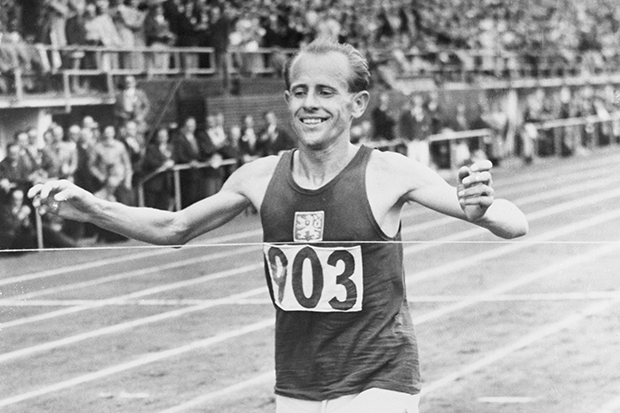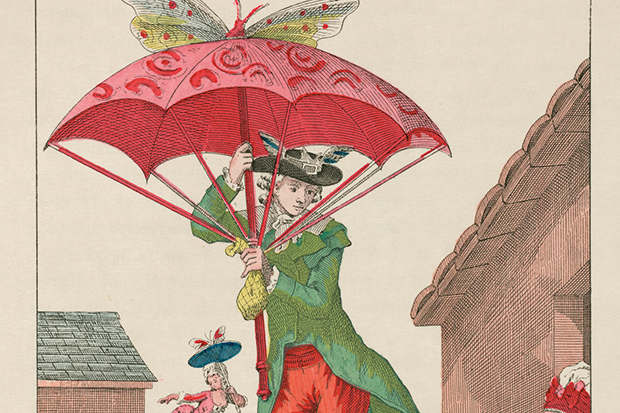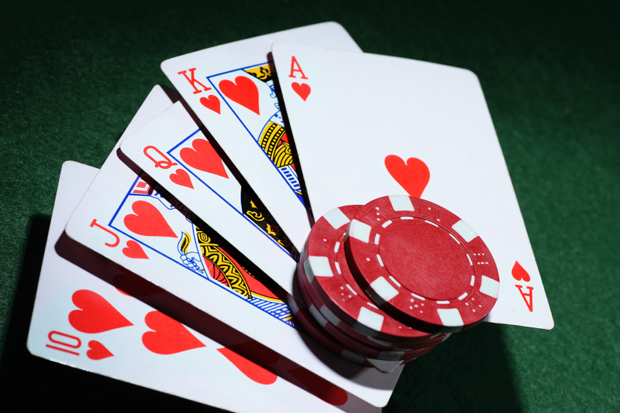The story of the Czechoslovak runner Emil Zátopek is a tale from athletics’ age of innocence. Without the aid of qualified coaches, state-of-the-art equipment or ‘performance-enhancing’ drugs, Emil Zátopek set no fewer than 18 world records over distances between 5,000 and 30,000 metres with a style memorably described as that of ‘a man wrestling with an octopus on a conveyor belt’: all eccentricity above the waist, all efficiency below it. Brought up in poverty, he ate when he could and what he could, and treated beer as a prototype isotonic drink.
His sporting career was set in the brief period of dominance of his specialist events enjoyed by runners from behind the Iron Curtain, an interregnum which lay between the era of the Flying Finns and the decades when the mantle of the so-called ‘kings of distance’ passed to runners from the Maghreb, Kenya and Ethiopia.
Zátopek devised high-mileage routines, running constant repetitions over short distances, sometimes training in army boots, in the snow and the dark, learning to endure high levels of pain. When his instinct told him to slow his pace, he increased it. Such new and unorthodox methods were alien to English rivals such as Christopher Chataway, though copied by others such as Gordon Pirie. Zátopek raced frequently and indiscriminately, both home and abroad, rather than concentrating like modern athletes only on major events. His popularity was enhanced by his generosity towards his opponents, whom he would encourage in mid-race,often in their own language. The rhythmic tri-syllabic cry ‘Zá-to-pek’ echoed round the stadia of Europe.
Of course his records have long since been broken. His main achievement — incapable of emulation — was the winning of a triple crown of gold medals at the 1952 Helsinki Olympics in the 5,000 metres, 10,000 metres and the marathon — a success made even more remarkable by the fact that he’d never run a marathon before. Sticking closely to the then world-record- holder Jim Peters, he asked him at the midway point whether the pace was good enough, to which Peters replied with calculated inaccuracy ‘pace too slow’. This retort caused Zátopek not (as Peters hoped) to buckle but to accelerate to victory.
Yet Zátopek might not have been in Helsinki at all. He had refused to go unless the team included another athlete denied selection for political reasons. Both Richard Askwith and Rick Broadbent, tracing Zátopek’s life beyond the track, describe his volatile relationship with Czechoslovakia’s establishment, conditioned by the many changes to the country’s status throughout his career.
Zátopek’s first job was for the Bata shoe factory, which, during the second world war, supplied footwear for the soldiers of the Reich. Later he joined the army, rising to the rank of lieutenant colonel. A vocal supporter of the Prague Spring of 1968, he paid the price when the Russian tanks rolled in. He was exiled, far from his wife and home, to work as a manual labourer in drilling operations, and sought solace in alcohol.
He then twice publicly (and maybe pragmatically) recanted his earlier views, thereby alienating himself from the reformers, though remaining an object of suspicion to the communist elite. Nonetheless, these statements enabled him to find new employment in Czech television, monitoring overseas developments in sports science. Once again he was able to travel abroad and to acquire various awards.
There were accusations that he was not merely a turncoat but a spy for the security services. Both authors, after reviewing the evidence, acquit him of the charge, presenting him as a victim rather than a villain. When he died in 2000 after suffering multiple strokes, a state funeral was proposed, but rejected. Nonetheless, the private ceremony held in the National Theatre in Prague was attended by the Czech prime minister. The reconciliation of the man with his country was complete, and the diversity of the crowd who attended proved that he was a sporting hero not just for his time but for all time.
It seems to have been a coincidence that, without celebrating any anniversary, these two books on Zátopek, both by award-winning sports writers, are published at the same time (and at the same price). Rick Broadbent claims ‘extensive access’, and Richard Askwith ‘unparalleled access’ to those who knew Zátopek, and their acknowledgments suggest a considerable overlap in oral sources, not least Zátopek’s voluble nonagenarian widow, herself winner of a gold medal for the javelin in Helnsinki. Broadbent’s blurb claims that his is the ‘first biography’ to deal with his subject’s life in all its dimensions. I would say it was a dead heat.
Got something to add? Join the discussion and comment below.
Get 10 issues for just $10
Subscribe to The Spectator Australia today for the next 10 magazine issues, plus full online access, for just $10.
'Today We Die a Little: The Rise and Fall of Emil Zátopek, Olympic Legend', £15.29 and 'Endurance: The Extraordinary Life and Times of Emil Zátopek', £15.29 are available from the Spectator Bookshop, Tel: 08430 600033
You might disagree with half of it, but you’ll enjoy reading all of it. Try your first month for free, then just $2 a week for the remainder of your first year.














Comments
Don't miss out
Join the conversation with other Spectator Australia readers. Subscribe to leave a comment.
SUBSCRIBEAlready a subscriber? Log in